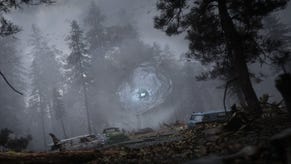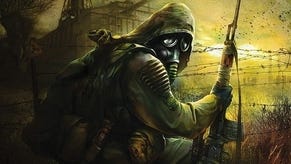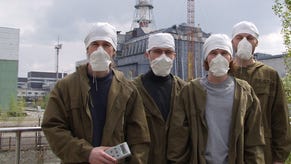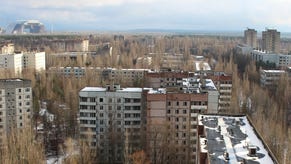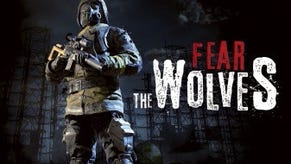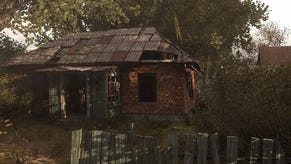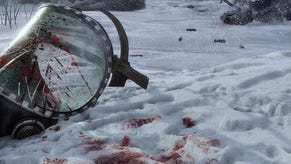S.T.A.L.K.E.R.: Shadow Of Chernobyl
In the zone.
Combat is vicious and clunky. Rather than the refined gun-juggling of something like Half-Life 2, this is a case of just putting the other guy down as quickly as possible. You're not going for headshots to feel good about your gun skills; you're doing it to save ammo, and to stop him from ending your adventure. It reminds me of Operation Flashpoint, where the tension mounts as you track down that last hostile and take his head off before he can remove yours. It's frustratingly hard at times, and the lack of a quicksave [true at the time of review, although apparently different for release code - Ed] means lots of ugly sorties to the main menu to save your location. Patching yourself up relies on the time-worn standard of health-kits, but also bandages and food, which can be applied in different situations to bump up your battered self. Getting hold of increasingly expensive Stalker suits is essential, since they protect you from radiation and give some armour against the increasingly high-calibre gunfire.
So anyway, what I should have done instead of trying to pass the creatures in the valley was head back to the trader who had given me my mission and purchased some more ammo. Derelict the zone might be, but it is far from abandoned. The stalkers rely on a network of traders to ply their zone-bound business. You'll start out doing jobs for one of the traders and end up dealing with a surly mafia barman, a vicious fascistic General, a beleaguered scientist, and other random, grizzled men. Each of these characters is trying to make his fortune in the zone, and many will have jobs for you, if you want them. These characters are almost all forgettable, lifeless creatures. Stalker's NPCs are far from the refined caricature of Alyx Vance; instead they're functional and two-dimensional, but they also seem to suit the game world completely. Who would make a living in the zone except for damaged, distant men? That's not to say that the game world is characterless, and there's plenty of subtleties that create weirdly rich moments with the NPCs. Coming upon a fireside camp, where five men in stalker suits sit and listen to one of their number playing an acoustic guitar, is quite mesmerising. Eventually he puts the guitar away and the stalkers chat in Russian, with occasionally laughter breaking out. I've no idea if the dialogue sounds crappy if you can speak Russian, but the use of language is striking for a Britisher like me. Nor is it all-Russian language, since much of what you need to know arrives simply in English text form, and vital bits of spoken dialogue are delivered in English, but with a heavy Eastern European accent. Otherwise it's untranslated Russian all the way, with warning shouts and incidental language all delivered in the motherland tongue. Another layer of atmosphere is laid down.
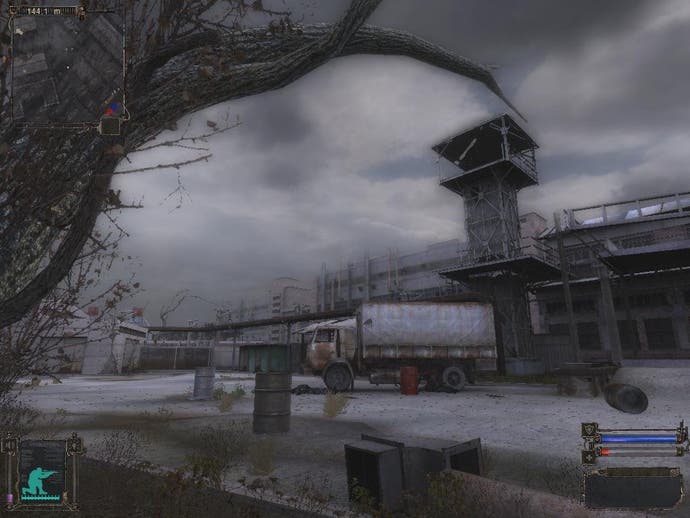
Dealing with the different characters in the zone is essential for your progress. The game is driven along by a core storyline, which you could follow unswervingly for a fairly linear experience. Where Stalker excels, however, is in the injection of random events and unforeseen side missions. You talk to someone and they need you to retrieve something, or you stumble upon a situation where you're told to help out - defending a camp or saving some lost soul. Most interesting still are the situations where things happen just because of the random 'living' nature of the zone. For example, I was coming back to the core 'bar' area from a nasty experience underneath a contaminated factory. On the way out I had seen some mercenaries lurking on a rooftop. I'd killed the ones who shot at me, but I knew others had survived unscathed. Gambling that they would still be in that position on the way back I scaled the building. On the way up I heard muttering: the mercs were still up there. I slaughtered them all and then, reaching the edge of the rooftop, I saw a patrol of men below. In my bloodlust I gunned them down too. On reaching the ground I realised that this second batch were from a faction I wanted to remain aligned to, and so I decided to reload. However, on my second pass through the same route things were very different. By the time I arrived at the building the allied soldiers were already engaged in a fierce gun battled with the mercenaries. They stormed the roof with me, gunning down the mercs to a man. Later, as the AI idled at the bottom of the building, I gleaned some information by talking to their leader.
In this way Stalker is occasionally brilliant. The AI can interact in such a way that fighting feels fluid and real. Other times they get stuck on a tractor or walk into each other infinitely. The game's vast possibility space is hit and miss, and occasionally surreal. One stalker I found was dead, but churning around grotesquely atop an oil-drum fire, while his mates casually sat around chatting. I looted the body and then carried on searching for a secret equipment stash I had marked on my map. If there's one thing that Stalker does brilliantly, it's lure you into exploring areas with the promise of loot and unveiled mystery.
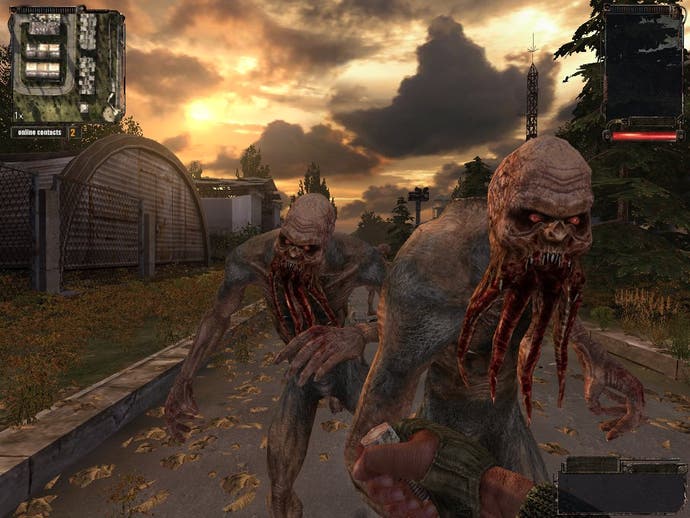
However, and this is one of those chasm-opening howevers that can doom a game completely, the way in which missions are delivered, and therefore the way the story is told, is often entirely random, and occasionally completely useless. The story, such as it is, is largely told to you by NPCs, but that doesn't stop vital information, important clues and plot-turning events from cropping up, unseen in the map/PDA information screen that you occasionally access to figure out what mission you're on. Furthermore you'll probably notice some MISSION FAILED messages appearing from time to time as your wander about killing things. These are missions that, unless you were paying close attention to your PDA, you probably didn't realise you were undertaking. Context-based missions, set off simply by your being present in an area, regularly crop up and you might have no idea they were there, or not care even if you did know. In this way Stalker fails utterly as a story-driven FPS. It's simply not good enough. Your only motivation is to see what incredible scenery or brain-pickling challenge you'll face next - there's almost nothing to care about. The very fact that one of the crucial story missions asks you to walk ten minutes south, when the overall sweep of the game is heading inexorably north, smacks of bad planning. Several times I carefully followed the instructions of context-based missions, only for nothing to happen. PROTECT THE STALKERS, I was told. The stalkers stood silently looking at me for several minutes. Nothing happened. I moved on.
Disappointingly, there's no co-operative multiplayer option for Stalker. On playing through you can see why. The single player is crucial to setting off various events, and having two of you running around the zone would be a staggeringly tricky problem for the designers. What multiplayer there is uses the setting well. It's a slow deathmatch, with lots of (er) stalking, followed by some brutal gun-battles in the ruined factories and dark forests. I can't seen the multiplayer being a hit, but I can see some weird and wonderful user-fabricated mods emerging from the materials delivered here.
For some people the odd rough brokenness of Stalker will frustrate and annoy. It isn't finely polished, and it's not Hollywood; this is more like an antidote to the Americanised way of doing things. It's a warped behemoth from the Ukraine, and one of the scariest games on the PC. Stalker will remind you of all kinds of prior games, and yet it will also defy your expectations. Like the mythological Chernobyl zone it is based upon, this game is a treacherous, darkly beautiful terrain. Not everyone is going to enjoy venturing into the zone, but some of those who do will find what they've been looking for.

